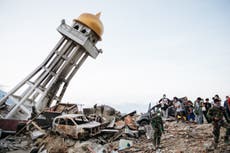This is how Europe's national borders could be redrawn after Brexit
These three regions of Western Europe could look very different within 10 years if the secessionists find new support in the wake of economic crisis and a rising tide of nationalism

A decade after the collapse of Lehman Brothers the ultimate effects of the global financial crash are finally being felt. As Brexit takes Britain into unknown territory, and Europe seeks to remodel itself without us, there may be another major shift in the making.
Since the end of the Second World War, no western European country border – that is, no border to the west of Leipzig – has moved. But now, thanks to the forces of nationalism revived by economic downturn, changes are afoot. By 2028, the map of Europe may have to be redrawn.
There are at least three regions within European countries that are at potential risk of secession as a result of the current political turmoil: Catalonia from northern Spain; Northern Ireland from the UK; and South Tyrol from north-east Italy.
How can you not sympathise with the plight of Catalans? Almost half the population of the region is deeply passionate about its unique culture, identity and politics. The appetite for a breakaway is there, but a handful of problems stand in the way of secession.
One is the way the political élite in Barcelona is forcing its hand. Former governor Carles Puigdemont's language was, and still is, crude; so is that of his successor Quim Torra. Both have tried to create ethnic barriers between two groups – Catalans with a purely Catalonian family tree, and those Catalans who speak Spanish at home and whose Galician and Andalusian family portraits embellish apartment corridors.
Feelings of mistrust between the sections of Catalan society are being artificially created by pro-independence nationalists, but many voters are wiser than that. They choose to rise above it; after all, there is nothing that Barcelonians like more than a bit of healthy banter with Madrid. All very mediatic.
Nevertheless, the Catalan story is a compelling one, which George Orwell shared and celebrated a long time ago. For a reason. This is why chances of an unexpected break-up are not to be dismissed. The separatist rhetoric weavers are also quick on their feet.
Northern Ireland is a second area of interest. It is going to face a major economic headache after March 2019. By leaving the EU, Northern Ireland will miss out on all-important agricultural subsidies and regeneration funds. In 2015, a study led by Dr Kurt Hübner of the University of British Columbia modelled different scenarios for Northern Ireland. It found out that leaving the UK joining the Republic of Ireland could generate €36bn of value over the first eight years of a united Ireland, with most of the economic benefits enjoyed by the northern territory.
Fragile Belfast governments – perpetually mediating between watchful, divided communities – have propped up as much by London as they have by Brussels. Unionists, overwhelmingly in favour of Brexit in 2016, might instead find they must admit the need to opt for the financial support of an economically resurgent Dublin in the event of a major downturn – a case of being more loyal to the half-crown than the crown, albeit a major test of historic political allegiances
Finally, South Tyrol. The alpine region in Italy's north-east, no more than twice as wide as Luxembourg, is enjoying unusual prosperity with 2.9 per cent unemployment. It may not be on the international radar, but is consistently written about in the Italian press.
The current executive in the capital Bolzano, where the local government has always been run by the same party, is flirting with Vienna as never before. The conservative chancellor, Sebastian Kurz, has repeatedly offered the Austrian passport to South Tyroleans, and a fast-growing minority quite likes the idea of accepting it.
A referendum isn't on the cards just yet, but anti-Italian sentiment is bubbling away. There's a cultural clash at the foot of the Dolomites that's never been resolved: in the area, only one party is campaigning in both German and Italian (the latter spoken by 30 per cent of the electorate who will vote on 21 October for the local parliament) – the pro-peace Greens.
Elsewhere there are smaller battles starting to break out, such as the strive for independence on Denmark’s Faroe Islands.
A decade on from the financial crash, we need to get ready for another one prompted by the departure of the UK from the European Union. The impact of that will be to stimulate nationalistic tendencies and the urge for self determination - and could leave the European map looking very different indeed.


Join our commenting forum
Join thought-provoking conversations, follow other Independent readers and see their replies